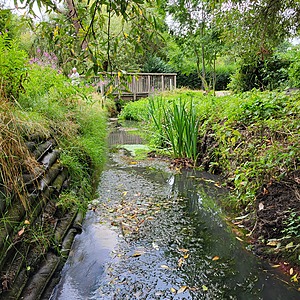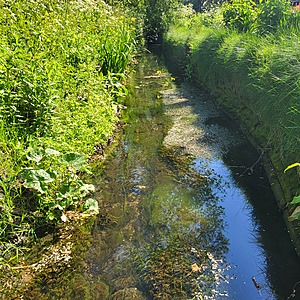
Yeading Brook
London, Harrow, United Kingdom
Site by a wooden bridge. Stream is usually small with medium flow but can become very fast high and flashy when it rains. mostly striaght high banks, Bare clay bed in areas.

- Site ID: Yeading Walk
- Lat: 51.5853342
- Lng: -0.3692651
- Waterbody Type: Stream
- Timezone: Europe/London
Latest photos
View all photosHard rained heavy a few days before, water fast and slightly cloudy
Riverfly monitoring:
Gammarus =290.
Other species observed:
stickleback =40mm,
Hoglice 320,
red midge larvae 4,
leech 25
Pea muscles 10,
Horse leech 2
dead invertebrates in Riverfly sample
River medium flow, no smell
The large quantity of fimamentous algae makes doing the kicksampling difficult
Sweage fungus observed coating stones and on the tips of aquatic vegetation.
Black algae (non furry) also observed
This is the worst I have seen it for a long time.
some oil also observed floating on surface
110 gammarus caught, dead invertebrate in sample
70 gammarus shrimp and 1 cased caddis caught Rivefly monitoring
some sewage fungus observed on the tips of aquatic vegetation,
Some dead invertebrates observed
Large amounts of thick sewage fungus observed at the Northumberland road bridge, 70m in lenglth
Areas of site very silty,
Some dead invertebrates
Heavy rain the previous day.
2.50ppm is maximum reading possible for phosphate hannah checker?
Normal flow
Some dead invertebrates observed
500 gammarus caught
Dead invertebrates and pale invertebrates, observed
Very heavy rain a few days previously, washed a lot of silt (1 ft deep) away
some Vegetation also swept away
880 gammarus caught
1 stickleback fish caught
pea muscles x3
leech x8
water hoglice x 60
flatworm
River flow seems low, which seems strange as it has not been dry weather.
The species of grass growing out of the sandbags has been identified as Rye grass, which may not be ideal for encouraging biodiversity and has limited use for wildlife.
There is a large amount of filamentious algae growing on stones and surfaces, more than has ever been previously observed in 3+ years. This could indicate high nitrate or phosphate levels.
Unfortunately we were unable to conduct ammonia and phosphate tests today.
Some dead invertabrates observed.
The Brook smelled bad!
265 Gammarus
1 olive baetidae
Other species observed:
-2Chronimid midge (red midge larve)
-5 midge larve
-1 blackfly larvae
-180 water hoglice (huge increase, 16 counted last month)
-1 large horse leech
-1 Glossiphonia leech
-15 small leech
- 1 pea muscle
- Stone loach eggs( probably, this species of fish last observed here in May last year)
- Flatworm
- 4 Aquatic worms
- 1 mealworm (relocated to dry land wood area)
- egg purse/plant root 1.5cm
Work was done earlier in the day to remove sedge from the banks from the stream, so this may have disturbed the bed.
The whole river appears tohave a faint white coating, making it cloudy. Turbitity is 30+(Max reading) however.
Some dead invertebrates found
Medium Flow.
Warm weather
Other species found:
red midge larvae
Aquatic worm
16 water hoglice
18 small leech
1 small fish fry
2 slugs (relocated them to dry land)
Flatworm (Dugesia Lugubris)
2 very large European Fish leech 20cm when stretched out. One escaped from the tray!
People in the park keep telling us about how the river would frequently change colours often 30+ years ago due to the Kodak factory at Headstone disposing of their chemicals in it. It is noticable that the Riverfly results get better the further away from Headstone you go. Could there be some residual damage to invertebrates caused by these chemicals lingering in the environment? Have tests ever been done?
Silver nitrate is one of the chemicals named in the prosessing of paper at the factory, there will be many others too.


